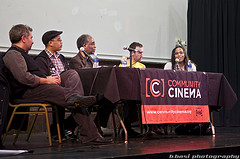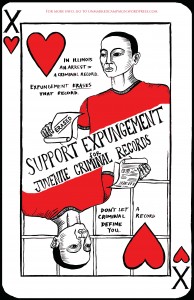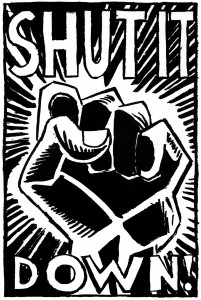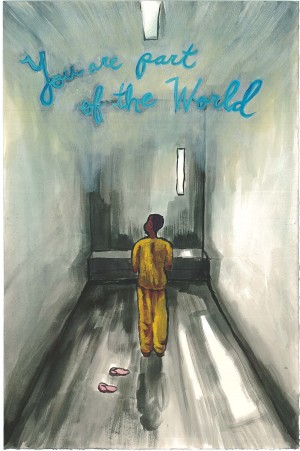
I was privileged to organize and moderate an event that included the screening of a new film called Me Facing Life: Cyntoia's Story on Saturday. The event was well-beyond capacity with over 270 people packing the room at the Chicago Cultural Center. The panelists were friends and colleagues who are brilliant and talented. They brought their experience to bear in discussing what the film got right about the plight of girls in conflict with the law and what it got wrong.
Each panelist started off responding to the question: What about the film resonated with you? And they were asked to also elaborate a little on the work they do.
Sharmili, who is the executive director of Rape Victim Advocates, appreciated the complexity shown in the film. She said that people like things to be simple and like black & white issues. She believes that nuance is important in telling stories about people’s lives. Sharmili was particularly struck by the invisibility of the men and boys – we don’t hear from them. There was an absence of the male perpetrators and the men who had influence in Cyntoia’s life – both for good and for bad. Sharmili is tired of hearing people only holding mothers accountable in these stories.
Shobha, who is the project coordinator of the Illinois Coalition for Fair Sentencing of Children, talked about eliminating “life without the possibility of parole” for juveniles. Illinois is a “natural life” state. We need to ask why are we doing this? What are we accomplishing by incarcerating young people for life? For those that work with youth, they can understand that young people cannot even conceive of long-term consequences, so there is no deterrent factor in the sentencing. She pointed out that we are turning children into adults through the court system. This is FICTION. They are not adults. While we learned of the complexity in the film, in our courts there is no complexity. We only get fragments and bits & pieces of the story.
Vikki who a licensed social worker at La Rabida Children\'s Hospital and works with the National Child Traumatic Stress Network thought it was amazing that Cyntoia was alive after all that she’d been through. No one recognized her need for services and intervention early on. She was struck by Cyntoia’s coping skills and emphasized the importance of concentrating on the resilience of young people like Cyntoia. When she encounters young victims of trauma like Cyntoia, the question is: How do they navigate in a world that has hurt them? She also reiterated the importance of focusing on the amazing resilience of young people like Cyntoia who are ‘doing what they feel they have to do to survive.’
LaDonna is with Visible Voices – the speaker’s bureau of CLAIM and speaks publicly about her experiences as a formerly incarcerated mother. LaDonna felt much in common with Cyntoia’s life story, particularly the mental illness stigma. She spoke poignantly and movingly about her own personal struggle with mental illness. She has heard people say “Why can’t you just get it together?” She recognized Cyntoia’s bi-polarity. When 3 generations of mental illness goes unmanaged, it gets worse. With 6 different caregivers in her early life, there was no way for Cyntoia to bond or form lasting attachments. She felt deficient. She reached out to the wrong people and lost trust.
Dominique said that the film describes many stories in one. She was particularly struck by the lack of accountability of the child welfare system. Where were they? Dominique felt that the D.A. in the film was really harsh and she talked about the traumatizing effects of the court experience.
Dominique is one of the founders of Young Women's Empowerment Project. They work with women ages 12 to 24 with experience in the trading sex for money and survival needs. Dominique said that if Cyntoia had YWEP, she wouldn’t be where she is today, and if Dominique hadn’t had YWEP, she’d be in Cyntoia’s shoes. She also made one of the most important points of the day when she underscores the fact that young people like Cyntoia are victimized by a number of institutions. She suggested that institutional violence is prevalent and yet often overlooked in the lives of young people. She previewed YWEP’s work with their “Bad Encounter Line” initiative. You can download the first zine based on reports from YWEP’s BEL here.
I then asked the panel: What did the film get right and what did it get wrong?
Vikki was troubled by the film’s emphasis on borderline personality disorder instead of post-traumatic stress. She felt that the emphasis on genetics and fetal alcohol syndrome is an “easy out”. It disallows culpability beyond the birth mother. She also took basic issue with the diagnosis that was proffered within the film for Cyntoia. She felt that the film missed the boat on understanding and describing the impact of trauma in the lives of young people like Cyntoia.
Shobha felt that the film missed the boat on the systemic problems. Institutions failed Cyntoia repeatedly. Shobha also noted the absence of the men in the film.
LaDonna has never seen a jail or prison that clean. Illinois prisons and county jails are not like that, and neither are any prisons or jails she’s ever heard of. She said that incarceration is an abusive environment. At a moment’s notice you are told to “Squat, Cough and Spread It”. She was mortified to see Cyntoia in solitary. A lot of sexual abuse is committed by guards in solitary because there are no cameras. LaDonna said that you don’t have a name in prison; just a number. It is a scary place to be as a child. She reminded the audience that Cynthia was only 15 when she was first locked up – that she was just a child. LaDonna pointed to the importance of not sanitizing the incarceration experience.
Sharmili added that people make jokes about rape in prison, but a prison sentence should not carry with it a high rate of sexual violence, the bulk of which is committed by prison staff. She urged attendees to support the Prison Rape Elimination Act (HB 1958).
Sharmili talked about all the crimes in the film that went unpunished – rape, human trafficking, pimping. Cyntoia was continually raped for money for her pimp. The 36 names of people she had sex with were 36 rapists and child molesters. Sharmili was making the point that there is selectivity in the type of crimes that we punish in our society and in who we choose to hold to account for “crimes.”
Vikki talked about the lack of advocacy for youth victims of violence. She has seen kids that run away from abuse and get thrown in jail and then get returned to the source of the abuse. They keep putting kids in jail for running away from home and no one bothers to ask them what they’re running away from.
As we closed the discussion, Shobha had these final words of caution: “Once we put someone in the system, we can’t take it back. Think about it”.
I want to thank everyone who was involved in the event particularly the amazing panelists who took the time to educate and share. Thanks to my friend Naomi for collaborating with me on this event and for taking such great notes which helped me to reconstruct what happened.
In the next couple of days, I am going to share some of my thoughts about the perils and promise of humanizing prisoners through storytelling. I have had a couple of experiences over the past few days that underscore the challenges of criminal legal organizing.




